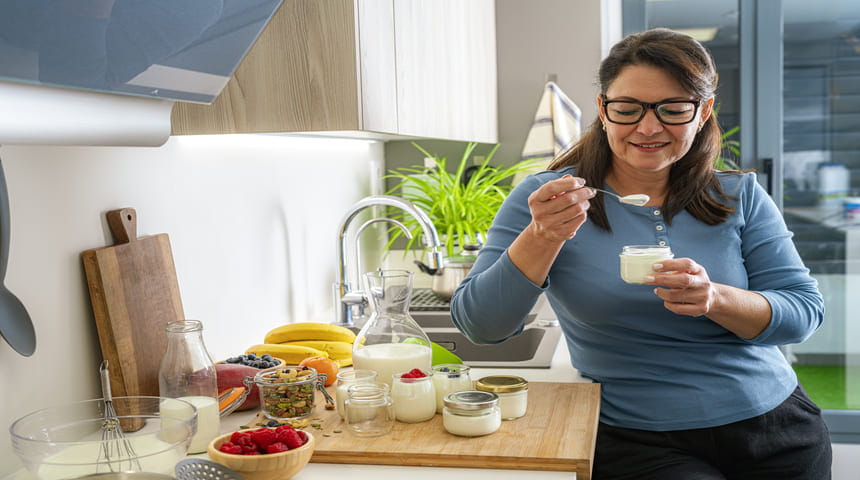We know that the foods you eat can have an impact both on your chances of avoiding cancer and helping your body fight the disease.
But the role of nutrition in cancer is a bit murky beyond this. There’s no magical dietary formula that can prevent or treat cancer. Rather, it’s an overall eating pattern that boosts your immune system.
Unfortunately, the Internet and social media are constant sources of misinformation about foods and diets with the supposed ability to prevent, or even cause, cancer.
Let’s take a look at some of the more common myths.
‘Superfoods’ Prevent Cancer
There is no single “superfood” you can eat that will prevent cancer. What’s important is eating a diet that includes fruits, vegetables, whole grains, nuts, seeds, beans and healthy fats, while excluding excessive amounts of sugar, processed foods, alcohol and tobacco.
Soy Can Cause Breast Cancer
There is nothing risky about eating soy, which can be a strong source of protein, dietary fiber, healthy fat and some nutrients. This myth is driven, in part, by the unfortunate fact that soy contains a chemical that looks similar, under a microscope, to estrogen – which can fuel the development and growth of some breast cancers. However, studies have repeatedly shown that the chemical found in soy does not behave the same way as the estrogen produced by our own bodies. In fact, there is some evidence suggesting that soy may actually have protective traits.
Eliminating Sugar Will Starve Cancer Cells
This myth is related to a misinterpretation of the quote: “Sugar feeds cancer.” It is certainly true that cancer feeds off the energy sources you consume. But that energy can come from sugar, protein or fat. Eliminating sugar simply forces the cancer cells to look elsewhere for food. However, if you have cancer, your body will be better equipped to fight if you feed it a nutritional diet, rather than one that’s heavy on sugary treats and sweets.
A Heavy Alkaline Diet Will Make Your Body Less Hospitable to Cancer
This one is driven by the idea that if you eat foods low in acidity, the cancer cells will have difficulty growing. The diet includes alkaline-rich foods like citrus, nuts, ginger, garlic, root vegetables and leafy green vegetables. The problem with this thinking is that you can’t change the pH level of your blood with food alone. You can change the pH of your spit and urine, but your lungs and kidneys work together to regulate the pH levels in your blood. Still, there is value in this diet – in that it encourages you to eat healthy foods and avoid others that are less nutritious.
Artificial Sweeteners Cause Cancer
There is no scientific evidence showing that artificial sweeteners cause cancer. There have been limited studies involving rodents, but those cannot be extrapolated to humans. But keep in mind that if you are fighting cancer and your body is craving sugar (indicating a need for energy), you aren’t going to get it from artificial sweeteners. In fact, they may actually intensify your craving for sugar.
Organic Foods Protect You from Cancer
Organic foods are getting a lot of attention today, but there’s no evidence to suggest organic fruits and vegetables have more nutritional value or any cancer-fighting attributes. There’s also no evidence that they are safer to eat. But if eating organics makes you more likely to consume valuable vitamins and nutrients, then go for it. Keep in mind that all of your fruits and vegetables should be thoroughly rinsed in warm water to help you avoid unwanted contaminants and residue.
Keto Diet Can Bolster Your Defenses
In general, the keto diet can be problematic for your health, though it has been shown to have some success in people with epilepsy. The idea of using it for cancer is traced back to that misconception about reducing sugar to starve cancer cells. The problem with a heavy keto diet is that it deprives your body of critical carbohydrates it needs for fuel.
In many instances, there’s nothing particularly wrong with following these nutritional myths – as long as they encourage you to eat healthier. But there are dangers if the diet (keto and sugar-restriction, for example) restricts access to important nutrients. Before adopting a new diet, talk with your nutritionist, doctor or care team to make sure it fits with your treatment plan.
Choose to Stay in Touch
Sign up to receive the latest health news and trends, wellness & prevention tips, and much more from Orlando Health.
Sign Up for HealthBeat





